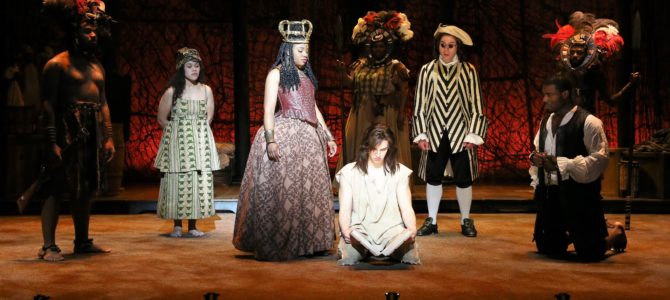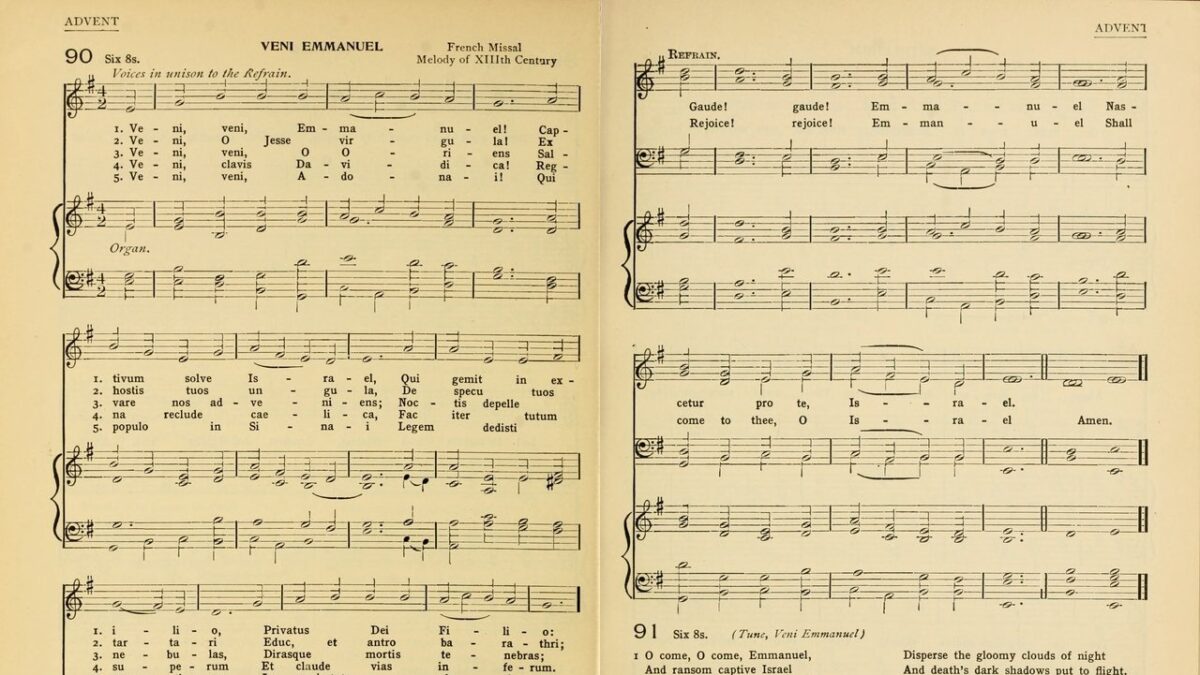
“I’ve spent over 40 years in theater doing mainly original shows,” says Gabriel Barre, director of “Amazing Grace: The Broadway Musical” currently playing in Washington D.C. “It is hard to find, first, a great story. And, second, one that’s never been done before in this medium. Quite surprisingly to all of us, this fell into both those categories.”
Having directed Idina Menzel and premiered an original Stephen Schwartz production, among other highlights of his storied career, Broadway veteran Barre knows of which he speaks. This summer, he is helming the historically based musical at a newly opened D.C. performance venue—the $800 million, high-tech Museum of the Bible.
“It’s a cool place for this show to be staged,” says actress Debora Crabbe, a co-star. Only weeks ago she won a prestigious Helen Hayes Award for her role in “As You Like It” at The Keegan Theatre. “People experience all these historical facts and contexts of the Bible itself, then this musical finds its inspiration in the same text. It ties everything together and people gain more from the experience.”
Presented five times every weekend throughout the summer, the story Barre raves about is not without controversy. The world’s most-sung hymn, “Amazing Grace” was born of a depraved sailor who for years bought and sold men, women, and children. He was betrayed, enslaved in Sierra Leone, rescued, and nearly shipwrecked before finding faith. It’s a surprising narrative for a rousing musical, especially with its stark portrayals of chattel slavery such as helpless people being branded by hot iron.
“My goal is great storytelling and sensitivity,” says musical writer and composer Christopher Smith in a phone interview. “You don’t want to offend your audience, obviously, but the characters within the story are going to do what they do. You have to follow that as a writer. Once you try to engineer a show to not offend, you get the most bland sort of blah story.”
Since its Broadway run in 2015, the team has worked to appeal to audiences beyond merely the faithful. “From the title alone, people might dismiss this as a religious show,” says Barre. “Yet it’s an amazingly dramatic story. Forgiveness, redemption, second chances—all of these themes pulled me in.”
Faith and Redemption on Broadway
A former youth counselor and police officer, Chris Smith spent over ten years adapting the British hymn writer’s early life in story and song.
John Newton (1725-1807) followed in his father’s footsteps, working as a sea captain with the Royal Africa Company who bought and sold black lives into slavery. A dramatic conversion led John to repent and join the abolitionist movement. (The story differs from the 2006 film “Amazing Grace,” a political drama centered on reformer William Wilberforce wherein an elderly Newton makes a brief cameo.)
“The spiritual heart of this story was very alien to people on Broadway—and still is,” says Smith, going on to quote cynics he met. “’You want to do what? Tell the story of a 1700s guy who was a slave trader? That sounds really controversial. So then he has this religious revelation, he changes, and he becomes a priest. Why are we doing a musical about this?’ I really had to sell it throughout that whole time.”
Along the way, the show has attracted national and local theater talent who resonate with its themes of faith, redemption, and human dignity. They include Tony Award winner Chuck Cooper, Josh Young (“Jesus Christ Superstar”), Erin Mackey (“Wicked”), Chris Hoch (“Beauty and the Beast”), Kelli Blackwell (“Chicago”), and current co-lead Abby Middleton.
“I’ve been brought up in the Christian faith, and it is part of my life,” says Middleton, who portrays Newton’s love interest. “I initially viewed the show through that lens, seeing its parallels with the story of the Prodigal Son. Everyone can relate to a belief in goodness and forgiveness, which spring from [her character’s] faith. She wants to change this world for the better and stand up for what’s right.”
Premiering on July 16, 2015, at the historic Nederlander Theatre in New York City, “Amazing Grace: The Broadway Musical” played through that October. Its press coverage was overwhelmed by another musical opening that summer—a little production called “Hamilton.” Looking back, the director sees other factors at play.
“Certainly, you never open a show on Broadway and hope it runs for only three months,” says Barre, whose résumé encompasses dozens of shows including “Aida,” “Memphis,” and the original production of “Almost, Maine.” “Many folks didn’t think it could run that long, frankly. They knew we had a quality show, but prejudice exists about anything that carries religious overtones or a spiritual nature.”
Backed by longtime producers Carolyn Rossi Copeland and Alex Rankin, a national tour of the musical was soon planned. Then, Museum of the Bible executives came on the scene and decided they wanted “Amazing Grace” as the first show in the institution’s performing arts center.
Setting the Scene
To tackle the dehumanizing practice of slavery in a stage show, particularly a musical intended for ages 10 and up, is no small undertaking. Both writer and director recognize the complexities before them.
“We felt it really important to present African and Caribbean cultures in an honest, authentic way,” says Barre. “We used two African languages in the show, Mende and Sherbro. Both would likely have been spoken in the vicinity of Sierra Leone during that time.” Costumes, dialects, and other cultural aspects were all meticulously researched.
During a critical early scene, a backdrop recreates an 18th-century flyer offering black lives to the highest bidder. Then a slave auction begins, with Newton speaking of the African people before him as wares for sale.
“It should shock people—it shocks me,” says Chris Smith. “That was a real poster. It’s one of many places where experts were involved to help us with history, phraseology, and even the movement of dances.”
Singing A Different Tune
In an invented subplot, Mary Catlett (whom Newton courts) recognizes her high-society life of tea and parlor rooms has made her complicit in the slave trade. Later, an unexpected antagonist upends standard narratives on slavery. Mirroring Newton’s real-life journey, actress Debora Crabbe portrays a princess in Sierra Leone who enslaves him alongside her own people.
“It is a true historical fact that some African people did sell their own members,” says Crabbe, who grew up in Ghana. “There’s not much talked about it.” Aspects of the story, including the role of Princess Peyai, were shortened as the show moved off Broadway. Originally three hours with an intermission, “Amazing Grace” now clocks in at approximately 105 minutes.
The young actress sought to make her embodiment of the authoritative woman memorable. “The power and presence of the princess drew me to this role,” says Crabbe. “I don’t want her villainous side to be the message. This princess really commands the room and leads her people.”
Barre has found solutions as “Amazing Grace” economized beyond its length. The musical has gone from a cast of 32 on Broadway, to last year’s national touring company of 22, to now 15 performers for its run this summer.
“As a director, I embrace limitations because they force you to be even more creative,” says Barre. “That’s certainly been the case as this show has changed its scope. In a bizarre way, as you downsize the physical production, the ideas and content of the story seem to expand proportionally. It’s a really interesting phenomenon.” A recent NPR story called the musical “remarkable” and “surprising.”
Those behind the musical admit it does not present the full intricacies and horrors of slavery. Crabbe, who has lived in the U.S. since grade school, notes that the central journey of John Newton keeps it focused. “The auction portrays aspects of the pain and suffering of black slaves,” she says. “But it’s not much to have people see the full repercussions and historical context.”
In real life, Newton took decades to forcefully disown slavery after his Christian conversion; here it happens in one act.
Messages of Hope in Contentious Times
By the end, even those in the audience unaccustomed to musical theater can be seen drying their eyes. “Laughter in a theater can be false,” says Smith. “But tears are always true.”
The writer/composer, who is currently working on a new musical about the life of early American founder William Penn, urges those who see it to draw their own conclusions as to how it may apply today.
“If there is a point of ‘Amazing Grace,’ it is this,” says Smith. “We need to examine our own lives and our own wretchedness, and then do something about it. Which is exactly what John Newton did.”
After presenting this story now hundreds of times on stages across the United States, director Barre notes how one man’s transformative journey continues to influence people centuries later.
“Too often in our culture and country, especially with young people, they don’t see options,” says Barre. “They think they’re stuck. If I could have everyone take one thing away from this show, it would be: it’s never too late. It’s never too late to fall in love. It’s never too late to make something of yourself. It’s never too late to give back.”
With five live shows every weekend, “Amazing Grace: The Broadway Musical” runs through August 18 on the World Stage Theater at Museum of the Bible in Washington, D.C.









